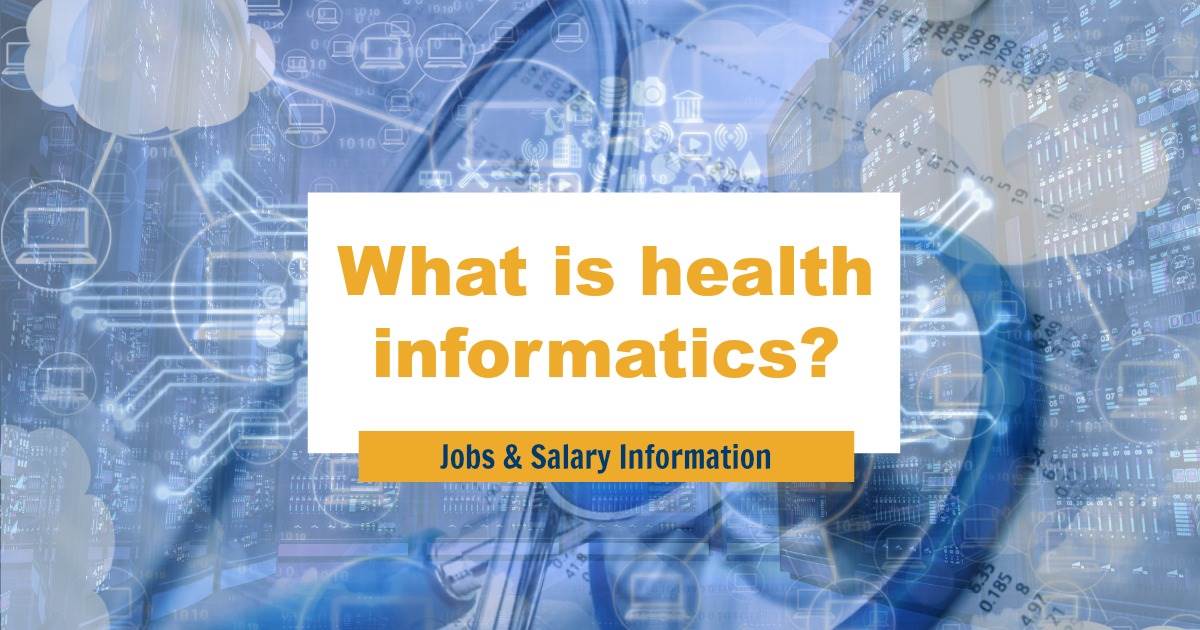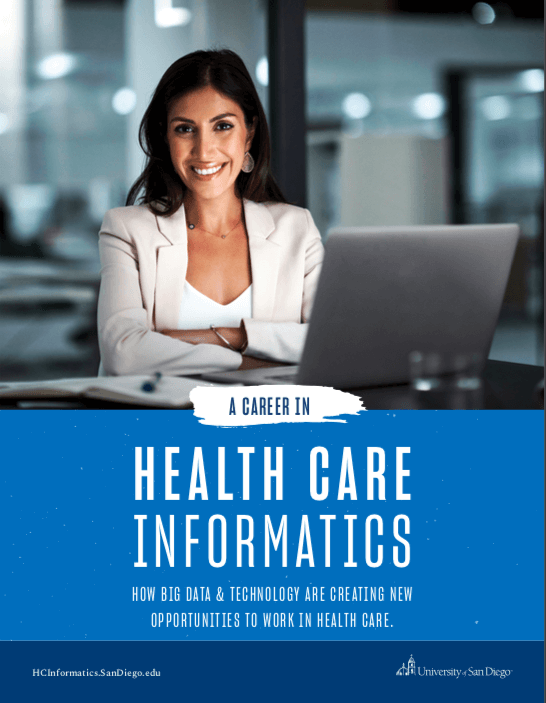What is Health Informatics?
Health care informatics is, at a very basic level, the use of data and information technology to meet the quadruple aim goals of health care: improved clinical outcomes, lower cost of care, improved experiences for both patients and providers, and to provide better care in a more cost-effective manner. It also has important applications for health care professionals, public health specialists, insurance industry professionals, medical researchers, health care professionals administrators, biotech companies and more.
While there are many competing definitions of health informatics, two things are certain:
- Health informatics is revolutionizing the practice of health care, from caring for individual patients to improving the health of entire populations.
- Health informatics is one of the nation’s fastest-growing job sectors, with well-paying career opportunities for those with the right experience and training.
According to the American Medical Informatics Association (AMIA), “health informatics applies principles of computer and information science to the advancement of life sciences research, health professions education, public health, and patient care. This multidisciplinary and integrative field focuses on health information technologies (HIT), and involves the computer, cognitive, and social sciences.”
In the continually evolving field of health informatics, the goal is to use this data and the insights it produces to:
- Improve patient care at the individual and clinical level
- Improve the health of entire populations (for example, by using data to predict and even prevent outbreaks of disease in a particular geographical area)
- Enable health organizations to deliver care more cost effectively
The widespread use of health care technologies and data management has allowed many health care specialties to utilize health informatics in ways that work best for them, meaning there is no “one size fits all” understanding of the field. Here is a closer look at some of the primary subdisciplines that fall under the umbrella term “health informatics.”
Applied Clinical Informatics
AMIA classifies clinical informatics as “the application of informatics and information technology to deliver healthcare services.” This classification of health informatics refers directly to the tools, technologies and tactics used directly by clinicians in their delivery of care. Clinical informatics can refer to using information science in connection with anything from electronic medical records to diagnostic tools like radiology and pathology. Medscape.com calls clinical informatics “a growing medical subspecialty devoted to using data to improve patient care.”
According to the AMIA, clinical informatics now affects a broad range of health professionals (physicians, nurses, dentists, pharmacists, etc.) and covers a diverse group of topics, including:
- Clinical decision support and documentation
- Population health and High-Reliability health care
- Health data analytics and data visualization
- Visual imaging (radiological, pathological, dermatological, ophthalmological, etc.)
- Provider order entry systems
- Complex socio-technical systems design, implementation and adoption
Clinical informatics is now an officially recognized medical subspecialty that requires practitioners to pass a certification exam administered by the American Board of Preventive Medicine. A new AMIA Health Informatics Certification is also being developed for applied health professionals who are not eligible for the Clinical Informatics Subspecialty, reflecting the growing importance of contributions being made by informaticists, and a national recognition of the informatics delineation of practice.
Nursing Informatics
According to HIMSS (the Healthcare Information and Management Systems Society) , nursing informatics is “the specialty that integrates nursing science with multiple information management and analytical sciences to identify, define, manage, and communicate data, information, knowledge, and wisdom in nursing practice.” Much like clinical informatics, nursing informatics is aimed at supporting clinical caregivers, in this case nurses, in their practice and in their ability to support and care for patients.
Today, the field of informatics holds great potential for nurses, especially those who have worked with health technology like electronic health records, remote monitoring/telehealth and clinical decision support tools. Knowledge and experience in informatics can position nurses both for clinical leadership roles and also for pathways that involve transitioning away from the patient bedside.
Public Health Informatics
In its application to public health, informatics takes on a slightly different, but similarly data-focused definition. The Public Health Informatics Institute defines this specialization as a discipline that “assures that the right technologies are used to improve timely delivery of quality data and assists data-driven decision making. It builds bridges across siloed public health work areas by ‘translating’ between these communities, creating opportunities for interoperable information pathways. Ultimately, public health informatics empowers disease interventions and prevention — leading to better health of individuals and the community in which they live.”
Translational Bioinformatics
Outside of direct patient care, there exists a level of informatics known as translational bioinformatics, which AMIA defines as “the development of storage, analytic, and interpretive methods to optimize the transformation of increasingly voluminous biomedical data, and genomic data, into proactive, predictive, preventive, and participatory health.” Primarily the domain of doctoral-level researchers, this area of health informatics is more focused on the research aimed at developing new techniques that apply to the entire health care field.
Health Informatics vs. Health Information Management – What’s the Difference?
For the layman, it can be easy to confuse these two distinct but closely related fields. At the risk of oversimplification, health information management refers to the practice of acquiring, analyzing and protecting digital and traditional medical information vital to providing quality patient care.
Health informatics professionals are responsible for ensuring that “the right information is available when and where it’s needed, while at the same time making sure it’s the highest quality data, it’s confidential and it’s secure,” according to Steve Wretling, chief technology and innovation officer for HIMSS.
[RELATED READING] How Health Informatics is Shaping the Future of Health Information Management >>
Future Implications of Health Informatics
Health informatics has transformed health care in ways that have significant implications across clinical care, health management, disease prevention and health policy. While some of those results cannot be foreseen, there are indicators of how health informatics is revolutionizing health care across the following disciplines.
Clinical Implications
At the clinical level, informatics is being used to improve both individual patient care and the health of entire populations. Health care informatics is revolutionizing how clinicians diagnose and manage patient care, thereby ensuring that care is delivered safely and is tailored to the individual. On a larger scale, informatics is improving the operational efficiency of health care delivery systems through identification of trends, outcome prediction and identifying care gaps and disparities between and among groups of patients.
Health care informatics is contributing to medical advancement and health care innovation by providing not only data, but the actionable information to improve processes, clinical outcomes and the overall experience for patients and providers. Because of these advancements, major tech firms have now focused on health care informatics as an area for investment and innovation.
Information Governance Implications
Policy implications of health care informatics will deal with privacy standards and data sharing regulations. As the United States and the world still debate how to best handle data privacy and security, the health care industry itself is figuring out how it can advance public health initiatives without violating patient privacy standards. Going forward, much will depend on what policymakers decide to prioritize in the name of worldwide health initiatives.
As technology has become an integral tool in providing high-quality health care, there is increasing emphasis on effectively and securely managing the troves of data that now give providers enhanced insights into every aspect of care. With this amount of connected technology comes questions about levels of access, and how much is too much. Data privacy standards will have to be adjusted and monitored as the capabilities and usage of health care informatics continue to expand in the years to come.
Working in the Field of Health Informatics
As more and more organizations across the health care spectrum look to reap the benefits of informatics, there is a growing need for employees who possess both clinical experience as well as proficiency in information technology or informatics. This has created high demand for qualified health informatics professionals.
A search for “health informatics” job openings on platforms such as “LinkedIn” will result in several thousand listings at a wide variety of companies across the nation. Listings for positions may include the following:
- Clinical Informaticist
- Health (or Clinical) Informatics Analyst (I,II, III, IV, Lead, Specialist, Manager)
- Health (or Clinical) Informatics Technician, Specialist, Product Manager,
- Health (or Clinical) Informatics Lecturer, Professor
- Electronic Medical Record Trainer
- Director, Clinical Informatics
- Chief Medical Information Officer (CMIO), Chief Nursing Information Officer (CNIO)
- Healthcare Chief Information Officer (CIO)
- Healthcare Informatics Security and Data Manager
- Health Informatics Consultant
[RELATED READING] Health Informatics Jobs and Salaries >>
With strong demand and great pay, it is easy to see why a career in health informatics is so appealing. Opportunities are as diverse as the world of health care itself — from public health, veterinary, dental and clinical care to nursing, biotech, software development, telemedicine and the insurance industry. The number of practical applications for health informatics continues to grow, which means that diverse career opportunities will continue to expand as well.
For that reason, many current and aspiring health informatics professionals are taking advantage of specialized master’s degree programs that build on their work experience and knowledge of the health care field while refining their programmatic, technical, analytical and leadership skills. Programs like the MS in Health Care Informatics offered at University of San Diego offer students a pathway to earn their degree while continuing to work full time, through flexible online courses, as well as evening classes offered on campus.
[RELATED] Opportunities in Health Informatics are Vast for Those with a Master’s Degree >>
Health Informatics FAQs
Q: What do health care informaticists do?
A: Health informaticists use their training and knowledge of health care, information systems, databases and information technology to gather, store, analyze and manage patient data and medical records. Informaticists can use this data for a broad range of applications, including to analyze trends, improve clinical workflow, improve overall quality of care and individual patient outcomes and even the health of entire populations.
Q: What are examples of practical applications of health care informatics?
A: Health informatics is being used across the health care field, from research to front-line care. Working in this field can require juggling many different responsibilities, but common day-to-day tasks include
- Developing information systems/processes that improve the quality and efficiency of care
- Building, optimizing, and maintaining electronic health record (EHR) systems
- Designing, developing and evaluating emerging technologies
- Providing data management, analytical, and leadership skills
- Designing and maintaining medical databases, computer networks and applications
- Evaluating the impact of IT on clinical workflow and outcomes
- Developing data analysis and utilization protocols
- Developing privacy and security policies and systems
More specifically, two unique applications of this specialization include projects for battling the opioid epidemic and combating sepsis and pediatric asthma. For more examples of how health informatics is being used to solve real-world health challenges, read “5 Exciting Health Care Informatics Projects.”
Q: Is health care informatics a good profession to enter?
A: Yes. In examining the career outlook for medical and health services managers, a job category that is closely connected to health informatics, the U.S. Bureau of Labor Statistics projects a 32% job growth by 2029; a rate much faster than the average for other occupations. The U.S. Bureau of Labor Statistics also projected annual salaries of $100,980 for people working in this field. The COVID-19 pandemic has brought additional attention to the field, which is likely to further increase employer demand. Moreover, job surveys consistently indicate that professionals working in the field have a high level of job satisfaction.
Q: How can I build a strong health care informatics resume?
A: Those who aspire to work in health informatics should have high-quality interpersonal skills, communication skills, problem solving skills, project management skills, knowledge of health data systems, EHR expertise, data analytics knowledge, programming knowledge, knowledge about the health care industry, and an understanding of clinical quality and value-based care . From there, many consider additional training, in the form of advanced coursework or a master’s degree, to gain additional health care and IT knowledge as well as to develop critical health administration, project management and leadership skills.
Q: How does health informatics improve the quality and delivery of health care?
A: Broadly speaking, informatics is being used to improve both individual patient care and the health of entire populations of people. At the micro level, health care informatics is revolutionizing how clinicians diagnose and manage patient care, thereby ensuring care is delivered safely and is tailored to the individual. At the macro level, informatics is improving the operational efficiency of health care delivery systems through identification of trends, outcome prediction and identifying care gaps and disparities between and among groups of patients.
Health care informatics is contributing to medical advancement and health care innovation by providing not only data, but the actionable information to improve processes, clinical outcomes and the overall experience for patients and providers. Because of these advancements, major tech firms have now focused on health care informatics as an area for investment and innovation.
Q: How does informatics prevent health care fraud?
A: While its primary intention is not to prevent fraud, some informatics strategies, like data analytics, can support fraud detection. According to Health Payer Intelligence, analytics platforms and visualization dashboards can be used to detect patterns in provider fraud, visualize fraud activity to determine the prevalence of fraud and help audit claims information.
Q: How does health care informatics improve patient safety?
A: Health care informatics analyzes and leverages real patient data from a myriad of sources and practices — such as electronic medical records, information sharing and medical record transparency — to improve diagnostic accuracy. Utilizing authentic patient and health care data and patterns to inform care choices improves the quality of care and ultimately patient safety.
Q: How is health informatics essential to the handling and processing of information in health care?
A: Health informatics makes it possible for the health care industry to handle and maximize the massive volume of data that exists today. Valuable medical data is continually generated in today’s hyper-connected world (think medical devices, patient records, insurance claims, billing departments, and even wearables). According to IBM Watson, the amount of medical data being generated and stored is now projected to double every 73 days, with each person generating enough health data in their lifetime to fill 300 million books. With health informatics, health care providers, researchers and clinicians can extract value from that data and improve care.
Q: What is nursing informatics and how does it affect health care?
A: According to HIMSS, nursing informatics is “the specialty that integrates nursing science with multiple information management and analytical sciences to identify, define, manage, and communicate data, information, knowledge, and wisdom in nursing practice.” This field of study is aimed at supporting clinical caregivers, in this case nurses, in their practice and in their ability to support and care for patients. Knowledge and experience in informatics can position nurses both for clinical leadership roles and also for pathways that involve transitioning away from the patient bedside.




